New Orleans Saints
Alvin Kamara signed a two-year contract worth $24.5 million extension with the New Orleans Saints on October 24, 2024, keeping him with the team through the 2026 season.

Alvin Kamara signed a two-year contract worth $24.5 million extension with the New Orleans Saints on October 24, 2024, keeping him with the team through the 2026 season.
Alvin Kamara’s latest contract extension is more than just an agreement between a star running back and his team—it’s a statement of loyalty, a commitment to legacy, and an investment in the future of the New Orleans Saints. On October 24, 2024, Kamara signed a two‐year extension valued at $24.5 million, a deal that not only secures his place in the Saints’ backfield through the 2026 season but also solidifies his long-standing declaration that he intends to retire as a Saint.
A Career Built on Loyalty and Impact
Since being selected in the third round of the 2017 NFL Draft, Alvin Kamara has become synonymous with the New Orleans franchise. From his early days that saw him named Offensive Rookie of the Year, to his multiple Pro Bowl selections, Kamara has consistently been an offensive dynamo. His dual-threat ability as both a rusher and a receiver has redefined the modern running back role. Over his eight-year tenure, he has amassed impressive statistics—including over 6,000 rushing yards and 60 touchdowns—that have etched his name in the annals of Saints history.
Kamara’s influence stretches beyond the stat sheet. Known for his agility, vision, and knack for turning difficult plays into game-changing moments, he has become a cornerstone of the Saints’ offense. His versatility has allowed offensive coordinators to design creative plays that exploit his speed and elusive running style. More importantly, Kamara’s commitment to New Orleans resonates with fans, who see him as the embodiment of the “Who Dat” spirit and a player who represents the soul of the city.
The Contract Extension: Key Details
The two-year extension, worth $24.5 million, includes more than $22 million in guaranteed money and incorporates additional performance incentives worth approximately $1.5 million. These financial details underscore the mutual commitment between Kamara and the organization. For the Saints, this agreement is strategically significant for multiple reasons. Not only does it secure one of their most productive players for the near future, but it also offers cap relief by restructuring existing salary figures—saving the franchise roughly $18 million against the 2025 salary cap, according to reports.
By opting to extend Kamara’s contract rather than letting him enter free agency, the Saints have effectively ensured that the team’s identity remains intact. Kamara’s previous contract, signed in 2020 and valued at $75 million over five years, was among the highest in terms of guaranteed money for running backs at the time. Now, as the market for elite running backs has rebounded with comparable deals for players like Saquon Barkley, Josh Jacobs, and even Derrick Henry on shorter contracts, the $24.5 million extension represents both a competitive market value and a nod to Kamara’s consistent, high-level production on the field
A Negotiation Reflecting Principles and Passion
It wasn’t without a stir that Kamara’s extension came into being. Earlier in the offseason, the veteran running back left mandatory minicamp to express his dissatisfaction with his existing contract—a move that signaled he wanted to be compensated at the level of today’s elite running backs. Despite generating intense trade rumors and media speculation, Kamara remained steadfast in his desire to remain with the franchise. His unwavering commitment was further evidenced when he debunked circulating reports on social media, affirming time and again, “I want to be a Saint.” Such statements not only reinforced his loyalty but also made it clear that his career aspirations were inextricably linked with New Orleans.
The extension negotiations appear to have been conducted with both pragmatism and passion. Kamara’s agent, Brad Cicala, confirmed details of the deal, emphasizing that the extension is structured to benefit both the player and the franchise. For Kamara, the financial terms are secondary to a deeper, more intrinsic motivation: the desire to finish his career in New Orleans. With the extension now in place, Kamara can focus solely on his performance, rather than being distracted by contract disputes or trade rumors.
On-Field Performance: Proving His Worth
This season, Kamara has consistently showcased why he remains one of the top running backs in the league. Through the first seven games, he has accumulated 438 rushing yards with six touchdowns on the ground. His ability to find the end zone, both on rushing plays and in the passing game—with 34 receptions for 252 yards and an additional touchdown—underscores his versatility and the vital role he plays in the Saints’ offensive scheme.
Kamara’s performance this season is a testament to his work ethic and adaptability. Even as the Saints have experienced a challenging stretch with a five-game losing streak following an auspicious 2-0 start, Kamara’s output has remained resilient. His production not only fuels the offensive momentum but also provides a steadying force for the team amidst on-field adversity. Veterans in the league understand that consistency, particularly at the running back position, can be the difference between success and mediocrity in a highly competitive NFL environment.
The Broader Impact on the Saints’ Organization
Securing Kamara’s services for the next two seasons does more than guarantee offensive stability—it sends a powerful message about the organizational culture within New Orleans. In a league where free agency is both a possibility and a threat, locking in a player of Kamara’s caliber reinforces the value the Saints place on loyalty and long-term vision.
For team executives, this extension offers both immediate and long-term strategic benefits. Financially, it provides salary cap relief, allowing the Saints to reallocate resources to bolster other key positions. Strategically, it establishes a cornerstone around which the team can build—especially when considering that the Saints have historically relied on veteran leadership to mentor younger players. In addition, the extension can serve as an attractive proposition for future free agents who are looking for teams with stable, long-term plans and a culture that values its players’ contributions both on and off the field.
The extension also acts as a morale booster. In an era where many veteran players move from one franchise to another in search of championships, Kamara’s decision to remain in New Orleans—despite the challenges the team may be facing—resonates deeply with fans and teammates alike. By declaring his intent to retire as a Saint, Kamara reaffirms the bond he shares with the community, ensuring that his legacy will forever be intertwined with the city’s football history.
A Comparison to Market Trends
The running back market in recent years has seen significant movement, with several high-profile players signing deals that reflect the unique valuation of the position in the modern NFL. While stars like Christian McCaffrey have secured enormous contracts, others—such as Josh Jacobs and Saquon Barkley—have also reaped benefits from the competitive market. Kamara’s extension, while modest compared to some of these deals in total value, is competitive in average annual terms and includes substantial guarantees that protect both the player and the team.
Moreover, the structure of Kamara’s deal reflects a broader trend in the NFL, where teams are seeking to balance star power with salary cap considerations. By front-loading some of the financial guarantees and negotiating a contract that aligns with the Saints’ cap strategy, the organization has demonstrated fiscal prudence without sacrificing talent. In this sense, the deal is a microcosm of the modern NFL’s focus on smart, flexible contracts that allow teams to remain competitive year after year.
The Fans’ Perspective and Legacy Implications
Fan reaction to the extension has been overwhelmingly positive. The New Orleans faithful have always regarded Kamara as more than just a player; he is a hometown hero who exemplifies the resilience, passion, and spirit that define the city. Social media posts abound with expressions of gratitude and excitement, with many fans praising his decision to stay in New Orleans. In forums and sports communities, supporters have lauded the move as a reaffirmation of what it means to be a Saint—a player who is as committed to the organization and its legacy as he is to personal success.
Media outlets and analysts have also noted that this extension could be seen as one of the final chapters of Kamara’s storied career. With his desire to retire as a Saint firmly on record, the deal provides a roadmap for a legacy that will be remembered for generations. His continued excellence on the field, coupled with his public declarations of loyalty, positions him to become one of the franchise’s all-time greats—a title that many fans and pundits believe he has already earned.
Looking Ahead: The Future for Kamara and the Saints
While the extension covers the 2025 and 2026 seasons, its implications are far-reaching. For Kamara, these next few years will be about cementing his status as a perennial contributor to the Saints’ offense and setting the stage for a celebrated retirement in New Orleans. For the team, maintaining the services of a player with his unique talents is critical, especially as they navigate a challenging season and work to rebuild or retool key aspects of the roster.
In the larger context of the franchise’s future planning, the extension is part of a series of moves aimed at keeping the core of the team intact. With veteran leadership in place, the organization can focus on developing younger talent and forging a competitive unit that balances experience with new energy. This holistic approach is essential for sustained success and is something that both the front office and the fans have eagerly anticipated.
Moreover, the extension serves as an anchor around which the Saints’ offensive strategy can evolve. With Kamara’s dual-threat ability, the coaching staff has the flexibility to design innovative plays that keep defenses guessing. As the NFL game continues to evolve—with increasing emphasis on versatile offensive schemes—having a player of Kamara’s caliber on the roster provides a significant tactical advantage.
Conclusion
In signing a two-year, $24.5 million contract extension, Alvin Kamara has delivered on both a personal and organizational level. His decision to remain with the New Orleans Saints—an organization and a city that he has long professed to love—demonstrates a rare blend of talent, loyalty, and commitment. The deal, with its significant guarantees and strategic cap benefits, is a testament to Kamara’s value as one of the league’s premier running backs and as an integral part of the Saints’ identity.
For fans, the extension is a confirmation that their beloved star will continue to lead the charge on the field, inspiring future generations of players and supporters alike. For the front office, it represents a successful negotiation that not only secures a proven performer but also reinforces the culture of long-term commitment that has always set the franchise apart.
As Alvin Kamara continues to break tackles, score touchdowns, and redefine what it means to be an elite running back in today’s NFL, his latest contract extension ensures that his contributions will be remembered as part of the enduring legacy of the New Orleans Saints. In a league marked by constant change and fleeting moments of brilliance, Kamara’s enduring presence is a stabilizing force—a reminder that sometimes, true greatness is measured not just in statistics, but in loyalty, passion, and the unwavering love for one’s home.
In the coming seasons, as the Saints look to build on their legacy and craft a competitive roster, Kamara’s role will remain central—both as a leader on the field and as an icon off it. By choosing to sign this extension, he has set the stage for what could be the final, and perhaps most cherished, chapter of an illustrious career. For a man who has often said he wants to retire as a Saint, this extension is not merely a contract—it is a promise kept, a dream pursued, and a legacy secured.
New Orleans Saints
Saints are wasting Spencer Rattler’s surprising start to the season
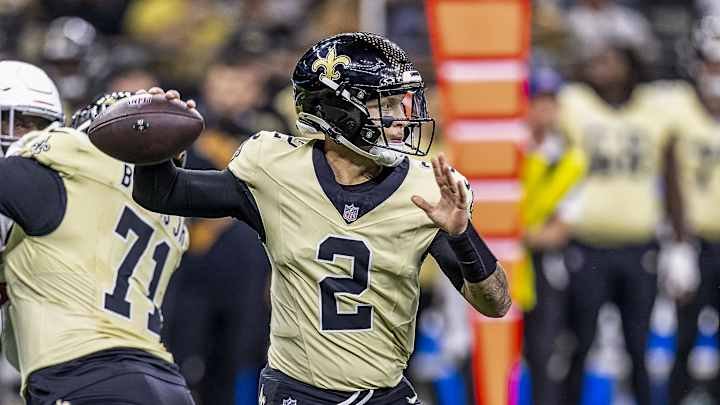
Saints are wasting Spencer Rattler’s surprising start to the season
The New Orleans Saints were projected to lose their first four games of the season by many. What wasn’t expected is Spencer Rattler playing well enough to win in both of the first two games. Unfortunately, the Saints are right where everyone predicted they’d be, 0-2. They’ve wasted winning performances by Rattler, and the Saints’ biggest obstacle has been themselves.
No one expected Rattler to play as well as he has. This isn’t to say he’s a top-5 quarterback, but Rattler has played well enough to fit the “wins aren’t a quarterback stat” argument. It hasn’t been perfect, but it’s hard to lay blame at his feet for either loss. Matter of fact, Rattler had the best game of his career against the San Francisco 49ers.
In both weeks, the Saints have struggled to get off the ground early. In both weeks, the Saints had the ball with a chance to win in the final two minutes. In both weeks, the Saints failed to complete the comeback. Wash and repeat.
Early mistakes prove costly for the Saints
You can point to Juwan Johnson not catching the ball in the end zone versus the Arizona Cardinals. There are multiple moments that heavily impact a game, but with a play of that magnitude at that juncture of the game, it’s hard to find a bigger moment. Against San Francisco, there isn’t necessarily that one moment to point to.
The Saints continuously kept stubbing their toe with errors in critical moments. Those errors came in different forms. You could point to penalties, points being left on the board, keeping drives alive. Let’s point at all of them, as those errors were the Saints’ downfall.
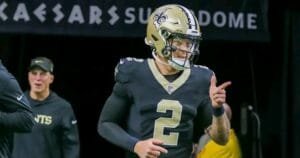
For the second week in a row, penalties have proven costly. A week ago the Saints had the same amount of penalties as points, 13. The penalties actually outnumber the points if you count the penalties that weren’t accepted.
Those 13 infractions tied the Tennessee Titans for the most penalties in the NFL in Week 1. The Saints brought referees to practice this week, but the penalties continued, in critical moments at that. The Saints gave up two first downs on third down due to flags in the secondary. The Saints also took two first downs away from themselves due to penalties.
It wasn’t just penalties. Johnson had a few drops early. There was no defender around this time. Blake Grupe missed yet another “sure thing.” These are players you’re going to have to count on, and they’re making critical mistakes. That’s not winning football, and you can’t put that on the QB. Worst part about it is the difficulty is likely about to go up. That makes the missed opportunities even harder to swallow.
Saquon Barkley Sounds Off on Former Teammate Daniel Jones’ Early Success With Colts
The Daniel Jones era of the New York Giants was forgettable, to say the least. Even though he showed flashes of promise at times and had Saquon Barkley coming out of the backfield, the Giants never got going, but now he’s begun turning things around while starting fresh with the Indianapolis Colts.
New Orleans Saints
Saints legend Drew Brees offers praise for Spencer Rattler as the team’s starting QB
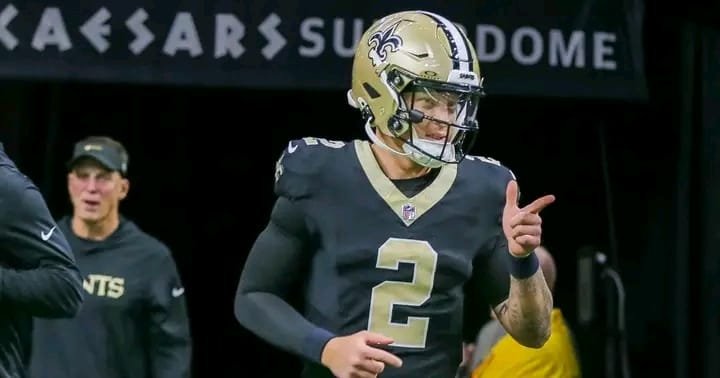
Saints legend Drew Brees offers praise for Spencer Rattler as the team’s starting QB
Spencer Rattler has one very important admirer.
Making an appearance on WWL-AM Thursday with Bobby Hebert, New Orleans Saints legend Drew Brees said he’s really liked what he’s seen out of Rattler in the start to the 2025 season.
“Spencer is a really dynamic player,” Brees said. “Stature wise, he’s a lot like me from the perspective of you’re not the tallest guy, but you’re athletic, you can move. I love the way he throws the ball. He’s made some plays running the football that have been really impressive over the last couple of weeks, getting some key first downs, breaking tackles.
“Just some gutsy performances. It hasn’t resulted in wins, but we’ve been right there.”
Rattler earned the Saints starting quarterback job out of training camp, beating out second-round pick Tyler Shough. He is one of eight quarterbacks who have started a game for the Saints since Brees retired following the 2020 season.
A fifth-round pick in last year’s draft, Rattler is still looking to lead the Saints to his first win as a starting quarterback. New Orleans went 0-6 with him as a starter last season, albeit with an extremely depleted roster, and is off to an 0-2 start this season.
But Brees stressed to be patient with the young quarterback, emphasizing the competitiveness the Saints have shown to start the season with Rattler operating the offense: New Orleans has had chances to tie or take the lead in the closing minutes of each of their two losses to start the season.
“They’re right there, I mean literally right on the cusp,” Brees said. “… They just have to find a way to break the seal, get that first win, start developing some confidence and momentum.”
Through two games this season, Rattler is completing 65 % of his passes with three touchdowns against zero interceptions. As a runner, he’s added 43 yards on eight carries, with two of those runs converting critical down and distance situations last week against the 49ers.
“When I watch Spencer play, he’s got all the traits,” Brees said. “He’s got some moxie, he plays with some swagger, kind of a chip on his shoulder. The guys seem to like him and play hard around him. He can make all the throws, he can make plays with his legs, he’s not afraid to take off and run and lower his head to go get the first down.
“For all those reasons, I think we have to be patient with him and recognize that, man, it’s going to happen, and hopefully it happens soon.”
New Orleans Saints
Saints set to sign new lease to stay in the Superdome. Here’s a look inside the deal.
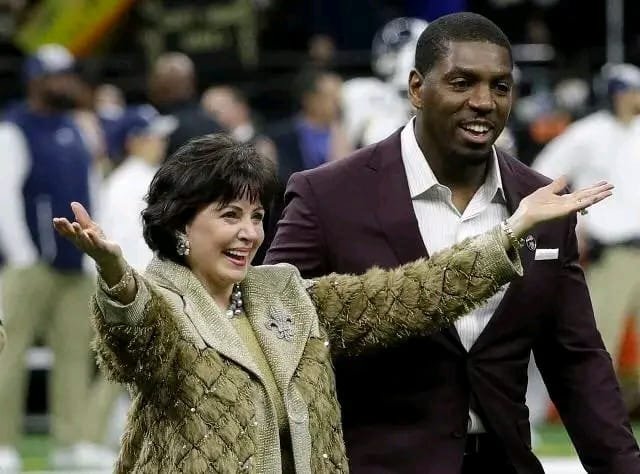
Saints set to sign new lease to stay in the Superdome. Here’s a look inside the deal.
A long-term deal between team officials and Gov. Jeff Landry’s allies on the Superdome Commission is expected within days.
The New Orleans Saints and Gov. Jeff Landry’s team are closing in on a new long-term lease of the Caesars Superdome that aims to keep the franchise rooted in New Orleans for at least another decade.
The deal, which three sources familiar with the talks say could be announced as soon as next week, culminates more than a year of grueling, often contentious negotiations between the Saints and the Louisiana Stadium and Exposition District, the board that oversees the state-owned Superdome.
Neither the Saints nor the LSED, known as the Superdome Commission, have announced specifics publicly. But the sources close to the negotiations say the agreement calls for a 10-year lease followed by four 5-year extensions, with the Saints retaining the right to exercise each extension. If all the extensions are agreed upon, it would run through 2055
The deal adds a new provision—absent from the Saints’ current lease—requiring arbitration and potential “equitable damages,” measures designed to discourage any future owner from moving the team out of New Orleans. The exact amount of that relocation penalty hasn’t been finalized, but the sources said it could reach $250 million.
The deal also involves other key provisions, which could be modified as the sides hash out final details. Among them: the Saints’ share of revenues from stadium concessions on game days; terms of the state lease for offices at Benson Tower; and other future revenue streams and costs.
The two sides have wanted to sign the lease by Sept. 17 because that’s the day an NFL owners sub-committee on special events will meet to begin considering who will host Super Bowls beyond 2028. After receiving broad acclaim for hosting the game in February, New Orleans hopes to be invited to bid on the 2031 Super Bowl. But it can only do so if the Saints have a signed lease agreement in effect for the year of the game, according to league policy.
The new agreement will end a negotiation that began shortly after Landry took office in January 2024. Saints officials negotiated a similar lease extension with officials from the administration of Gov. John Bel Edwards but didn’t reach a long-term agreement before his term ended.
Saints, state closing in on long-term lease extension, major Superdome renovation
Exterior shots of the Louisiana Superdome colored with lights for Carnival and the BCS game in New Orleans, on Jan. 4, 2008.
CHRIS GRANGER
“We remain optimistic that a final agreement will be reached soon and look forward to announcing it at the appropriate time,” Greg Bensel, a spokesperson for the Saints, said in a text. “Until then, negotiations with the State remain ongoing, and it would be premature to comment on specific deal points.”
Superdome Commission officials also declined to comment on the deal talks.
Shane Guidry, a businessman who is a close advisor to Landry, declined to comment on specifics but said agreement on lease terms is near. “We’re at the finish line,” he said. “We want to get it done for the Saints, the taxpayers, the state of Louisiana, the NFL, everybody.”
A closely watched deal
The Superdome lease is always closely watched by business and civic leaders, but for Saints fans the real question is what it means for the team’s long-term future in New Orleans.
This round of talks carries added weight: Because the lease could run through 2055, it will likely be in place past Gayle Benson’s lifetime — the trigger for an NFL rule that will require the team to be sold to a new owner.
Landry’s negotiating team has sought to bolster the state’s legal position in keeping the Saints here for the foreseeable future, the sources said.
Benson, 78, has vowed to keep the team in New Orleans while she is the owner. And in a series of 2021 interviews to discuss the Saints succession plans, Dennis Lauscha, the Saints’ president and the executor of the Benson estate, committed to keeping the Saints in New Orleans. He has also said that the terms of this lease negotiation would be crucial to keeping a future owner here. But it remains unclear whether the new deal will have strong enough language to prevent the team from being moved by the team’s next owner beyond those 10 years.
Lauscha has been the lead negotiator for the Saints, facing off with Rob Vosbein, appointed by Landry to serve as the Superdome Commission’s chair. Vosbein is a private attorney for Guidry. Also negotiating for the state has been Shawn Bridgewater-Normand, a lawyer and the wife of radio host Newell Normand.
The Superdome Commission is expected to formally approve the deal, which will replace the current agreement that consists of a 15-year lease followed by a 5-year extension that ends in 2030.
Deals aim to avoid relocation
The price of professional sports teams has risen dramatically in recent years, making ownership the domain of multibillionaires. Forbes valued the Saints at $5.3 billion in its annual analysis of NFL franchises, a 20 percent increase from a year ago.
Lawyers and executives with experience in stadium lease negotiations in other NFL markets said that any lease deal would likely have to include ironclad legal terms and financial penalties after 10 years to make it difficult for a future owner to move the Saints.
The new lease would require a new owner who moves the team to pay state taxpayers as much as $250 million to cover most of the $300 million that the state owes in bonds for the recent Superdome renovation, said the people close to the negotiations. That penalty steps down sharply after the first 10 years.
Mark Poloncarz, who has negotiated two lease extensions with the Buffalo Bills as the Erie County executive, said a more important question is whether the new lease includes language that would allow the state to go to court in New Orleans to prevent a new owner from moving the team.
“Unless there’s some clause that allows the community and the state to keep the team there, they could be gone after 10 years,” Poloncarz said.
In 2021, Benson said her instructions to Lauscha are clear when it comes to new ownership.
“That’s going to be one of our stipulations when we sell the team — that it stays here,” said Benson at the time. “Dennis won’t sell it to another person that wants to take it away.”
Louisiana Governor Jeff Landry, center, and his wife, Sharon LeBlanc, talk with New Orleans Saints and Pelicans owner, Gayle Benson, during the King’s Luncheon held at the Kennedy Center for the Washington Mardi Gras on Thursday, January 25, 2024. (Photo by Chris Granger, The Times-Picayune)
(Photo by Chris Granger The Times-Picayune)
While negotiators aren’t yet publicly outlining the terms of the new lease, two recent stadium deals offer some comparative terms.
In 2023, the Buffalo Bills signed a 30-year lease with language that discourages a new owner from moving the team. A year later, the Jacksonville Jaguars also signed a 30-year deal with similar terms.
Nellie Drew, a professor at the University at Buffalo School of Law who has studied the leases of the Bills and other teams, said cities and states often seek clauses in the leases that would make it harder for teams to relocate.
One defense is a legal term known as “equitable relief,” which allows the government to file suit to block the team from leaving. The Bills agreed to allow this type of lawsuit in the lease and to have the lawsuit be heard in a local or federal court in the Buffalo area.
“There is no way any judge in western New York is going to let the Bills walk,” Drew said.
If a judge did allow the team to leave, the lease requires the Bills to pay back taxpayers the full $850 million they spent to build a new stadium if the departure takes place within the first 14 years of the lease signing. In future years, the amount the new owner would have to pay taxpayers would drop by 6.25% per year. By year 30, that amount would reach zero.
In the Saints’ case, taxpayers spent about $380 million to pay for the most recent renovation of the Superdome, while the Saints ponied up an additional $180 million.
The financial penalty in the new lease of up to $250 million for relocating the Saints would probably not be a deterrent for a new owner given the vast sums required now to purchase a team, industry experts said. But it’s a significant change from the current lease, which did not have a similar financial penalty.
That lease took effect in 2010. The deal included an $85 million stadium upgrade that gave the Saints more ways to make money off games in the Superdome while capping direct subsidies to the team at $6 million a year. It also transferred naming rights at the stadium to the team, which the Saints have since sold to Mercedes-Benz and Caesars for millions of dollars annually.
In lieu of constructing a new stadium, which can cost billions of dollars, the sides have continued to pour money into upgrading the Superdome, which opened in 1975 and is the fifth oldest stadium in the NFL. The state completed a $560 million renovation of the facility in 2024, in time to host Super Bowl LIX this year. It was the stadium’s eighth Super Bowl, the most of any venue in NFL history.
New Orleans Saints
Kellen Moore must fix massive issue that he’s responsible for as soon as possible if the Saints want to win any games going forward
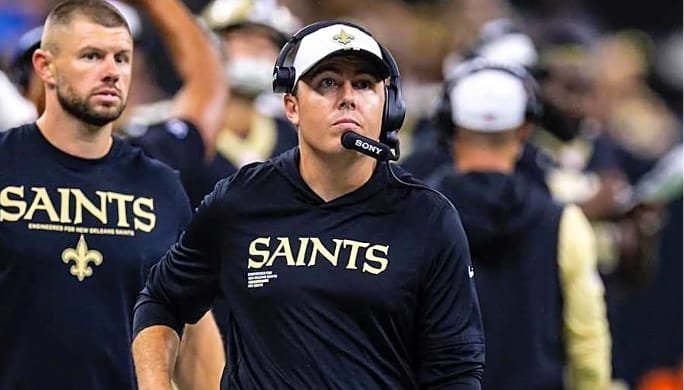
Kellen Moore must fix massive issue that he’s responsible for as soon as possible if the Saints want to win any games going forward
Fans of the New Orleans Saints have plenty of emotional ammunition to be frustrated with officiating over the years. For the black and gold in Week 1 of this season, against the Arizona Cardinals, they simply put themselves in horrible situations and forced the referees to hurt them even further.
New Orleans limped to just thirteen points in Kellen Moore’s debut as the team’s head coach. While there was the occasional bright spot on that side of the gridiron for New Orleans, the Saints couldn’t stop making small errors that caused some yellow laundry to hit the field.
Offensive penalties destroy New Orleans’ chances in Week 1
The Saints were whistled for sixteen penalties in Week 1 against the Cardinals. Thirteen of those were enforced, while the other three were declined. A whopping eleven of the penalties were called against the Saints offense, the unit that Kellen Moore is most responsible for – even as the head coach.
More ridiculously, eight of those eleven flags on the offense were pre-snap penalties. The Saints had three false starts, two illegal formations, two illegal shifts, and one offsides for that unit against Arizona, via Jeff Duncan. That is nearly impossible to fathom, but the Saints consistently shot themselves in the foot to make life harder on themselves.
Moore and his coaching staff must clean these issues up as soon as possible. The Saints do not possess enough talent on either side of the ball to overcome these sort of unforced errors. If New Orleans continues this sort of trend, it will be yet another frustrating season for Saints fans.
A major opportunity to build momentum for Moore’s offense and overall team was stymied by sloppiness, and that’s gotta change sooner rather than later. New Orleans’ task doesn’t get any easier next week when they face the 1-0 San
New Orleans Saints
FOREVER IN SAINTS HISTORY: Alvin Kamara Delivers 1,000th Superdome Touchdown, Giving New Orleans a Moment to Cherish
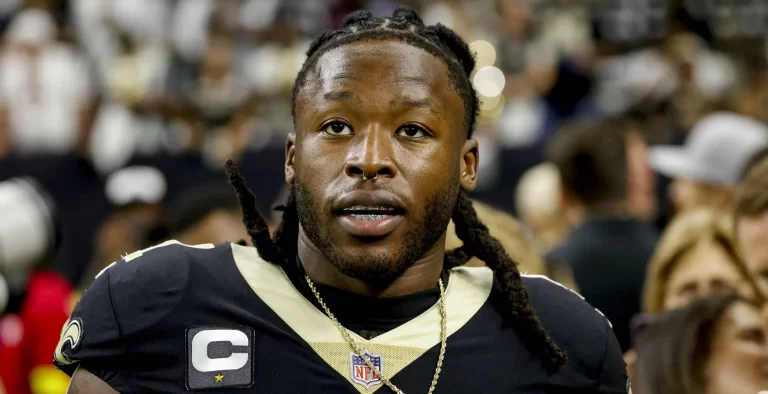
FOREVER IN SAINTS HISTORY: Alvin Kamara Delivers 1,000th Superdome Touchdown, Giving New Orleans a Moment to Cherish
The Caesars Superdome is more than just a stadium. For the people of New Orleans, it is a cathedral of resilience, joy, and unforgettable memories. From the deafening noise of the Dome Patrol years to the miracle ride of 2009, the building has witnessed generations of heroes carving their names into Saints history. On Sunday, even in defeat, another unforgettable chapter was written when Alvin Kamara delivered the 1,000th touchdown ever scored by the Saints inside their hallowed home.
Yes, the scoreboard read 20-13 in favor of the Arizona Cardinals by the final whistle. But if you were inside the Dome — or even just watching from home — there was a moment in the second quarter that made you pause, smile, and realize you were witnessing something that will forever live in the franchise’s story.
Kamara’s Milestone Run
With the Saints facing a third-and-three early in the second quarter, the offense needed a spark. The Cardinals defense had done its job so far, limiting Derek Carr and the passing game to short gains. Then, in a flash, Alvin Kamara reminded everyone why he has been the heartbeat of this offense for nearly a decade.
Taking the handoff, Kamara cut left, found daylight, and accelerated through a gap that only he could see so clearly. The run wasn’t just efficient — it was vintage Kamara. Smooth strides, impeccable vision, and that signature ability to make defenders look like they’re running in slow motion. As he crossed the goal line and celebrated with his teammates, the crowd roared louder than it had all afternoon.
At that moment, fans weren’t just cheering a touchdown. They were witnessing history. That 18-yard dash wasn’t only Kamara’s 87th career touchdown; it was officially the 1,000th touchdown scored by the New Orleans Saints in the Superdome.
Why This Touchdown Matters More
Football milestones come and go. A player scores a certain number of career touchdowns. A team reaches a statistical marker. But the 1,000th touchdown in the Superdome? That’s different.
Why? Because the Superdome isn’t just another NFL stadium. It is a living, breathing symbol of New Orleans. It has hosted Super Bowls, college championships, and concerts that shook the world. But more importantly, it has been the stage for Saints football since 1975 — the good, the bad, and the unforgettable.

From Archie Manning to Drew Brees, from Marques Colston to Michael Thomas, the Dome has seen legends come and go. It has carried the city through storms both literal and figurative. To hit 1,000 touchdowns in that building means you are not just adding to a box score. You are adding to a shared memory that belongs to every fan wearing black and gold.
For Alvin Kamara to be the man to deliver that moment feels perfectly fitting. He has been the face of the Saints’ offense since Drew Brees retired, carrying the torch of excitement and playmaking that keeps fans believing in better days.
Kamara’s Place in NFL History
The milestone wasn’t just about the Saints or the Superdome. It also added another jewel to Kamara’s personal crown.
With 87 career touchdowns, Kamara is now tied with Hall of Famer Lance Alworth for 53rd on the NFL’s all-time list. To put that into perspective: Alworth was an icon of the 1960s, a receiver so dominant they called him “Bambi.” For Kamara to match his number in today’s game — as a running back who does damage both on the ground and through the air — speaks volumes about his versatility and sustained excellence.
And here’s the kicker: Kamara is still just 29 years old. He has plenty of time to climb that list, possibly even cracking the top 25 before his career is over. Saints fans have known for years that Kamara is special, but achievements like this force the national spotlight to acknowledge it too.
The Bittersweet Side
Of course, milestones don’t erase results. The Saints lost 20-13 to the Cardinals, dropping their season opener and raising familiar concerns about the offense. Despite Kamara’s heroics, the passing game sputtered. Derek Carr and his receivers struggled to connect on big plays, and drives stalled too often in enemy territory.
It’s a story Saints fans know all too well. The defense did its job, holding the Cardinals to just 20 points, but without consistent offensive rhythm, it wasn’t enough. That’s why Kamara’s touchdown, as magical as it was, also felt bittersweet. It gave the Dome a reason to explode, but it didn’t translate into victory.
Still, if there’s a silver lining, it’s that milestones like these can become rallying points. Seasons are long, and every team needs moments to hang onto when the going gets tough. Kamara’s 1,000th touchdown could serve as one of those reminders that greatness is still present in New Orleans — and worth building around.
The Legacy of the Superdome
Think about what the 1,000 touchdowns represent.
They are Archie Manning scrambles in the late ’70s, Jim Mora’s gritty teams of the ’80s, the Dome Patrol striking fear into opponents, the heartbreaks of the ’90s, and the rebirth of the 2000s under Sean Payton and Drew Brees. They are Deuce McAllister breaking tackles, Marques Colston stretching out for the end zone, Reggie Bush electrifying crowds, and Steve Gleason’s unforgettable punt block that became a symbol of hope.
Every touchdown tells a story. Every one of those 1,000 scores is a piece of the larger tapestry that makes Saints football unique. Alvin Kamara just added his name to the most recent stitch in that rich quilt of history.
What’s Next for the Saints
The loss to Arizona is just one game in a long season. For head coach Dennis Allen and the offense, the task ahead is clear: find consistency, especially in the passing game. If Carr and his receivers can find a rhythm to complement Kamara’s brilliance, the Saints can still contend in a wide-open NFC South.
Meanwhile, the defense will continue to anchor the team. Led by veterans like Demario Davis and Cam Jordan, the unit is good enough to keep games close. What Saints fans hope is that the offense can catch up before too many more “bittersweet milestones” pile up.
A Moment to Cherish
In sports, results matter. Wins and losses define seasons. But milestones define legacies. Alvin Kamara’s 1,000th touchdown at the Superdome will be remembered long after the disappointment of a Week 1 loss fades.
For fans, it was a reminder of why they love this team, this city, and this stadium. It was a reminder that even when the Saints stumble, moments of magic are always possible in the Dome.
Kamara didn’t just score a touchdown. He carved his name into the very walls of the Superdome’s history, joining a line of legends who gave New Orleans reasons to cheer, cry, and believe. And that, perhaps, is worth celebrating more than any single win or loss.

